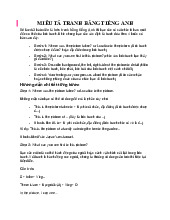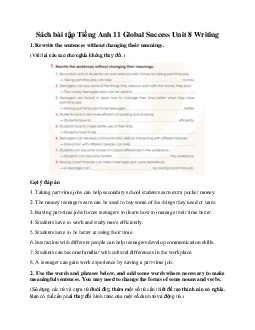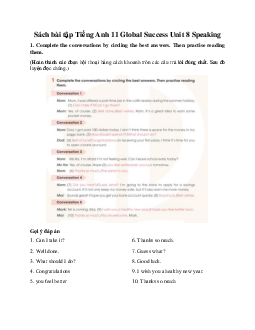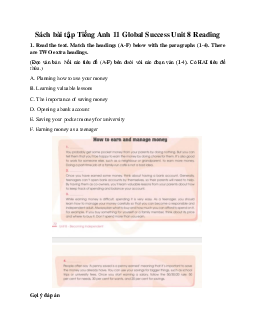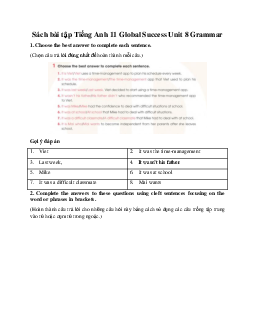








Preview text:
Trắc nghiệm tiếng Anh 11 Unit 8: Becoming independent
Question 1. Mark the letter A, B, C or D to indicate the word that differs from
the other three in the position of the primary stress A. apologize B. application C. optimistic D. pessimistic
Question 2. Mark the letter A, B, C or D to indicate the word that differs from
the other three in the position of the primary stress A. representative B. substantial C. technology D. redundancy
Question 3. Mark the letter A, B, C or D to indicate the word that differs from
the other three in the position of the primary stress A. territory B. librarian C. respectable D. victorious
Question 4. Mark the letter A, B, C or D to indicate the word that differs from
the other three in the position of the primary stress A. interpret B. internal C. interval D. interior
Question 5. Mark the letter A, B, C or D to indicate the word that differs from
the other three in the position of the primary stress A. reluctance B. attendance C. performance D. utterance
Question 6. During the trip, we can visit some wildlife reserves to see lions and giraffes.
A. That's great. How does it work? B. Oh, I see. No problem. C. Really? I am so excited. D. That was OK at first.
Question 7. Can I leave a message to Jim? A. I'll ask him to call you. B. Of course, you can. C. If you don't mind. D. Yes, you can take it.
Question 8. There wasn't a chair for the headmaster, ____ is a big problem. A. what B. which C. that D. where
Question 9. After the children finished their dinner, they went to bed ____
listened to a bedtime story before falling asleep. A. that B. and C. so D. while
Question 10. I like swimming ____ my sister likes jogging and dancing. A. whereas B. when C. whenever D. so
Question 11. The student wiped the board ____ was full of notes and drawings. A. that B. while C. after D. so
Question 12. ____ he was waiting for Sam outside the cinema, Jim realized
that the street was funnily crowded. A. So B. While C. Unless D. Even though
Question 13. True Blood is my favourite TV series, ____ I don't have much time to watch it often. A. although B. before C. if D. yet
Mark the letter A, B, C or D to indicate the sentence that is closest in
meaning to each of the following questions. (Questions 14 – 17)
Question 14. We might stop here if you don't change your way of speaking.
A. We might stop here unless you don't change your way of speaking.
B. We might stop here if you change your way of speaking.
C. We might stop here unless you change your way of speaking.
D. We might stop here if not you change your way of speaking.
Question 15. At no time Jane asks me when she uses my bathroom.
A. Jane is always using my bathroom without asking!
B. It is very unusual for Jane to ask me when she uses my bathroom.
C. Jane has no time to ask me when she uses my bathroom.
D. Sometimes Jane asks me when she uses my bathroom.
Question 16. He acts like an innocent man even if the evidence shows the contradiction.
A. Even though he acts like an innocent man, the evidence shows the contradiction.
B. He acts like an innocent man because the evidence shows the contradiction.
C. The evidence shows the contradiction so he acts like an innocent man.
D. He acts like an innocent man, as a result, the evidence shows the contradiction.
Question 17. We might stop here if you don't change your way of speaking.
A. We might stop here unless you don't change your way of speaking.
B. We might stop here if you change your way of speaking.
C. We might stop here unless you change your way of speaking.
D. We might stop here if not you change your way of speaking.
Read the following passage and mark the letter A, B, C, or D to indicate
the correct answer to each of the questions. (Questions 18 – 25)
One school in Hampshire, UK, offers 24-hour teaching. The children can
decide when or if they come to school. The school is open from 7 a.m. to 10
p.m., for 364 days a year and provides online teaching throughout the night.
The idea is that pupils don't have to come to school and they can decide when
they want to study. Cheryl Heron, the head teacher, said “Some students learn
better at night. Some students learn better in the morning.” Cheryl believes that
if children are bored, they will not come to school. “Why must teaching only be
conducted in a classroom? You can teach a child without him ever coming to school.”
Steiner schools encourage creativity and free thinking so children can study art,
music and gardening as well as science and history. They don’t have to learn to
read and write at an early age. At some Steiner schools the teachers can’t use
textbooks. They talk to the children, who learn by listening. Every morning the
children have to go to special music and movement classes called “eurhythmy”,
which help them learn to concentrate. Very young children learn foreign
languages through music and song. Another difference from traditional schools
is that at Steiner schools you don't have to do any tests or exams.
A child learning music with the Suzuki method has to start as young as
possible. Even two-year-old children can learn to play difficult pieces of
classical music, often on the violin. They do this by watching and listening.
They learn by copying, just like they learn their mother tongue. The child has
to join in, but doesn't have to get it right. “They soon learn that they mustn't
stop every time they make a mistake. They just carry on,” said one Suzuki
trainer. The children have to practise for hours every day and they give
performances once a week, so they learn quickly. “The parents must be
involved too,” said the trainer, “or it just doesn't work.”
Question 18. Which of the following is NOT true about 24-hour teaching?
A. Students can come to school from 7 a.m. to 10 p.m.
B. Students can study online at night.
C. Students can choose the time to study.
D. Some students need to study in the morning and some need to study at night.
Question 19. According to Cheryl Heron, teaching ____.
A. should happen throughout the night
B. is not necessarily carried out in class
C. is for children who will not come to school D. must be around the year
Question 20. Which of the following is TRUE about Steiner schools?
A. They are different from traditional schools.
B. Young children are not taught foreign languages.
C. Students must concentrate on music.
D. Students have to do exams and tests
Question 21. Which of the following is the most suitable title for the third paragraph?
A. Traditional ways of teaching B. 24-hour teaching C. Learn by listening D. Starting young
Question 22. Steiner schools don't ____.
A. encourage children's creativity and free thinking
B. allow teachers to teach things out of textbooks
C. teach reading and writing to young children D. teach music to children
Question 23. The word “involved” in paragraph 3 is closest in meaning to ____. A. engaged B. encouraging C. accepting D. rejecting
Question 24. The word“this” in paragraph 3 refers to ____.
A. starting as young as possible B. the violin
C. playing difficult pieces of music
D. learning their mother tongue
Question 25. Students learning music with Suzuki method ____. A. must learn difficult music
B. like to learn their mother tongue
C. stop when they make mistakes D. start at an early age
Read the following passage and mark the letter A, B, C, or D on your
answer sheet to indicate the correct answer to each of the questions.
William Sydney Porter (1862-1910), who wrote under the pseudonym of O.
Henry, was born in North Carolina. His only formal education was to attend his
Aunt Lina’s school until the age of fifteen, where he developed his lifelong
love of books. By 1881 he was a licensed pharmacist. However, within a year,
on the recommendation of a medical colleague of his Father’s, Porter moved to
La Salle County in Texas for two years herding sheep. During this time,
Webster’s Unabridged Dictionary was his constant companion, and Porter
gained a knowledge of ranch life that he later incorporated into many of his
short stories. He then moved to Austin for three years, and during this time the
first recorded use of his pseudonym appeared, allegedly derived from his habit
of calling “Oh, Henry” to a family cat. In 1887, Porter married Athol Estes. He
worked as a draftsman, then as a bank teller for the First National Bank.
In 1894 Porter founded his own humor weekly, the “Rolling Stone”, a venture
that failed within a year, and later wrote a column for the Houston Daily Post.
In the meantime, the First National Bank was examined, and the subsequent
indictment of 1886 stated that Porter had embezzled funds. Porter then fled to
New Orleans, and later to Honduras, leaving his wife and child in Austin. He
returned in 1897 because of his wife’s continued ill-health, however she died
six months later. Then, in 1898 Porter was found guilty and sentenced to five
years imprisonment in Ohio. At the age of thirty five, he entered prison as a
defeated man; he had lost his job, his home, his wife, and finally his freedom.
He emerged from prison three years later, reborn as O. Henry, the pseudonym
he now used to hide his true identity. He wrote at least twelve stories in jail,
and after re-gaining his freedom, went to New York City, where he published
more than 300 stories and gained fame as America’s favorite short Story writer.
Porter married again in 1907, but after months of poor health, he died in New
York City at the age of forty-eight in 1910. O. Henry’s stories have been translated all over the world.
Question 26: According to the passage, Porter’s Father was ______.
A. the person who gave him a life-long love of books B. a medical doctor C. a licensed pharmacist
D. responsible for his move to La Salle County in Texas
Question 27: Why did the author write the passage?
A. to outline the career of a famous American
B. because of his fame as America’s favorite short story writer
C. because it is a tragic story of a gifted writer
D. to outline the influences on O. Henry’s writing
Question 28: The word “imprisonment” in paragraph 2 is closet in meaning to _______. A. captivity B. escape C. insult D. punishment
Question 29: What is the passage primarily about?
A. The life and career of William Sydney Porter.
B. The way to adopt a nickname.
C. O.Henry’s influence on American literature. D. The adventures of O.Henry.
Question 30: The author implies which of the following is true?
A. Porter’s wife might have lived longer if he had not left her in Austin when he fled.
B. Porter was in poor health throughout his life.
C. O. Henry is as popular in many other countries as he is in America.
D. Porter would probably have written less stories if he had not been in prison for three years.
Question 31: Which of the following is true, according to the passage?
A. Porter left school at 15 to become a pharmacist
B. Porter wrote a column for the Houston Daily Post called “Rolling Stone”
C. The first recorded use of his pseudonym was in Austin
D. Both of Porter’s wives died before he died
Document Outline
- Trắc nghiệm tiếng Anh 11 Unit 8: Becoming independent
